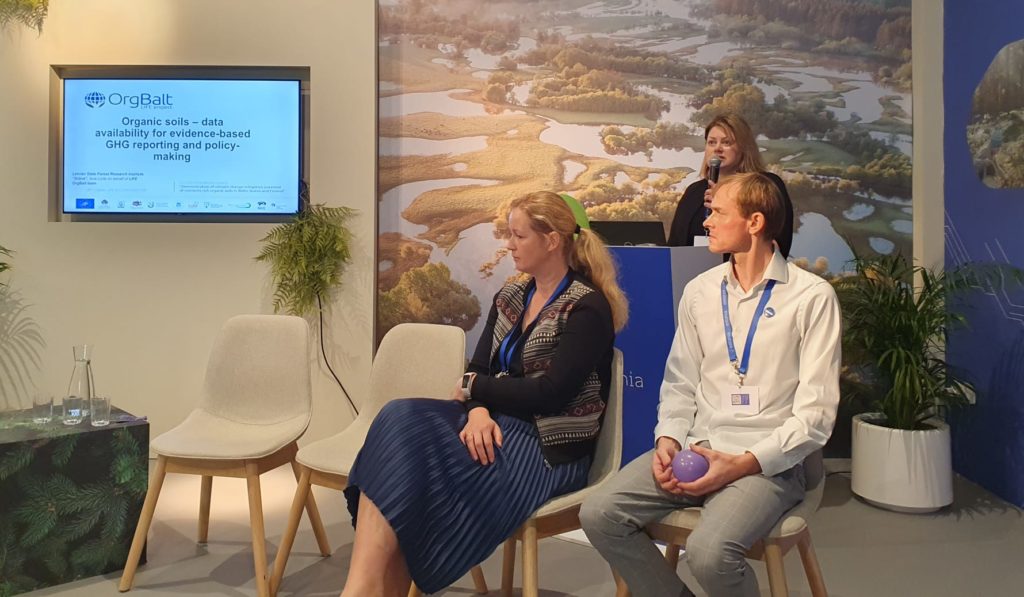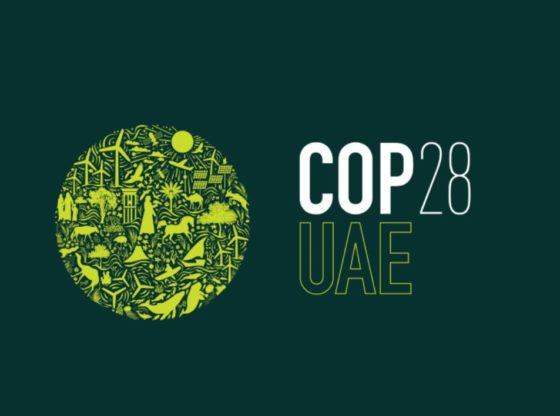The 28th edition of the Conference of Parties (COP28) took place in Dubai from 30th November to 12th December 2023. LIFE OrgBalt took an active part in the conference, presenting the project’s results and their potential contribution to the climate debate during the panel discussion “Contextualized Carbon Sequestration in Agricultural Soils: Potential and Limits” hosted within the Estonia pavilion.

Why is this year`s COP28 of particular importance for the Baltic States and for the LIFE OrgBalt project?
The Baltic States represent small nations with remarkable achievements and have asserted their desire to strive for climate neutrality by 2050. COP28 was the first Climate Change Conference where one of the Baltic States – Estonia, opened a national pavilion to host multiple thematic discussions on climate-neutral development.
Alar Astover, Professor of Soil Science, Estonian University of Life Sciences, moderated the session on the role of the contribution of agricultural soils in climate change mitigation by sequestration of carbon in mineral soils and reduction of GHG emissions from organic soils. Mineral soils were discussed by Ms Elsa Putku, Soil Science Expert, Centre of Estonian Rural Research and Knowledge, but the role of organic soils and data was presented by the LIFE OrgBalt project. The session focused on the discussion and demonstration of the significance of a locally contextualized approach, to achieve a more carbon-neutral and climate-resilient agriculture. Soils play a crucial role in climate change adaptation and mitigation, being the largest pool of organic carbon in terrestrial ecosystems. However, while it’s recognized that sustainable agricultural practices can universally enhance carbon storage in soils, the organic carbon sequestration potential of soils and its impact on climate mitigation varies significantly depending on local climate, soil types, and management practices.
Which role can agricultural soil play in the Baltic States climate adaptation and mitigation efforts? What about Baltic States cooperation?
“Agricultural soils in our region are generally rich in organic matter and constitute remarkable carbon stocks”, said Alar Astover, Professor of Soil Science, Estonian University of Life Sciences. Continuing he added, “The first intention should be to keep this good status and to define areas where soils have potential to sequester more carbon. This is important not only for climate adaption and mitigation but primarily for sustaining soil health and crop productivity. Our soils are very diverse also in the context of organic carbon sequestration potential. These highlights the need for a contextualized approach where site-spefic soil information from local and regional monitoring and research projects should be integrated for farming practices and policy recommendations. Baltic region countries are making today joint efforts to increase knowledge of agricultural soil carbon cycles and accounting in several ongoing projects as EJP Soil, MARVIC etc.”
How can the LIFE OrgBalt project contribute to COP goals and ambitions?
The regionally-specific drained-nutrient rich organic soils emission factors calculated within the project’s framework were officially presented for the first time at COP28. LIFE OrgBalt experts from all three Baltic States, Finland, and Germany, have been working in close cooperation since the midst of 2019 to calculate regionally specific GHG emission factors for agriculture and forest soils, thus providing locally specific data for GHG inventory improvements. “Parties are encouraged by IPCC guidelines for GHG inventories to use country-specific emission factors instead of default ones, and the LIFE OrgBalt project`s results positively contribute”, said Ms Ieva Lῑcῑte, Research Assistant, Latvian State Forest Research Institute ”Silava”, LIFE OrgBalt Project Manager. “Locally specific GHG inventory input data”, she added, “gives more precise GHG reporting outcome and more accurate data for policy planning. LIFE OrgBalt significantly enriched data available about drained organic forest and agriculture soils in the Cool Temperate Moist climate zone – the number of sites where GHG measurements have been done was roughly doubled”.
Background
COP is the annual United Nations Climate Change Conference, also known as the Conference of Parties, during which nations’ leaders, scientists, researchers, entrepreneurs and society’s representatives come together to discuss, negotiate and draw common solutions to address climate change and limit greenhouse gas emissions. COP 21, held in 2015, brought to the adoption of the historic Paris Agreement, the first universally legally binding global climate agreement which commits all party to limit global temperature rise to well below 2 degrees Celsius above pre-industrial levels, preferably below the more ambitious target of 1,5-degree.
References
Project “Demonstration of climate change mitigation potential of nutrient rich organic soils in Baltic States and Finland” (LIFE OrgBalt, LIFE18 CCM/LV/001158) is implemented with financial support from the LIFE Programme of the European Union and State Regional Development Agency of the Republic of Latvia. www.orgbalt.eu
The information reflects only the LIFE OrgBalt project beneficiaries view and the European Climate, Infrastructure and Environment Executive Agency is not responsible for any use that may be made of the information contained therein. par šeit atspoguļotās informācijas iespējamo izmantošanu.
For more information: LIFE OrgBalt Project manager Ieva Līcīte, ieva.licite@silava.lv


